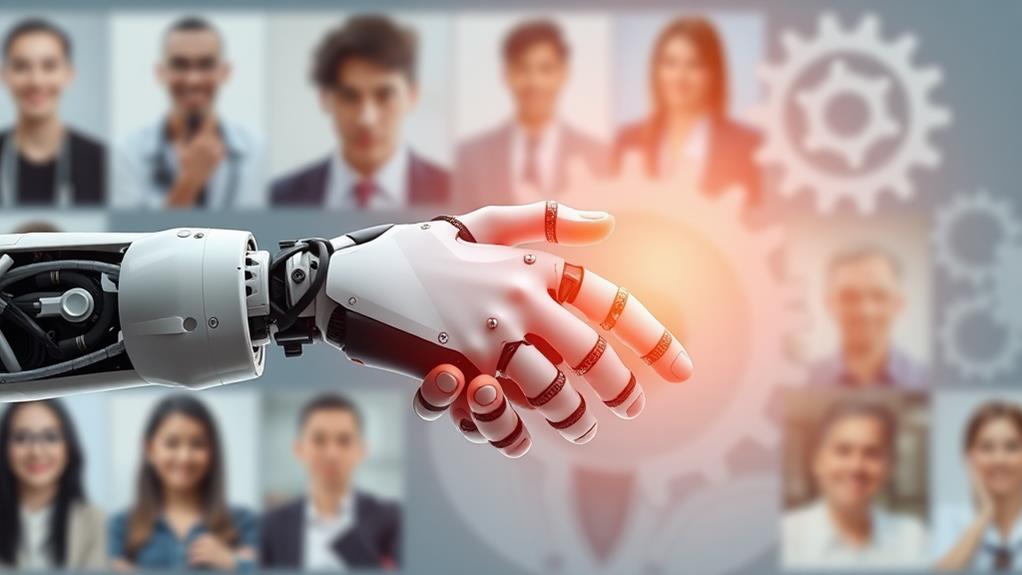Integrating automation into the workplace reduces cognitive workload and operational stress, as evidenced by 72% of employees reporting lower stress levels due to automation. Streamlining mundane tasks enhances job satisfaction and productivity, with 70% of employees favoring technical solutions for efficiency. Customer experience also benefits from automation, which enables timely service while maintaining essential human interaction. Balancing automation and personal touchpoints fortifies customer trust and brand loyalty. Advanced technology augments job roles, with 69% seeing it as an enhancement rather than a threat to their jobs. This combination of automation and human engagement fosters a healthier, more productive workplace. The influence of automation on performance extends beyond individual job roles, impacting overall business success. By automating repetitive processes, companies can allocate human resources to more strategic tasks, leading to improved efficiency and innovation. Furthermore, the ability to analyze data and generate insights through automation enhances decision-making and contributes to overall performance. Ultimately, the integration of automation in the workplace has a transformative effect, not only on individual employees but also on the organization as a whole. Powerful automation technology not only reduces the burden on employees but also paves the way for greater scalability and adaptability within the organization. With the ability to streamline workflows and eliminate human error, automation empowers businesses to stay agile and responsive in the face of evolving market demands. As a result, companies can achieve greater levels of efficiency, innovation, and ultimately, sustainable growth.
Key Takeaways
- Automation reduces workload and stress for 64% of workers, enhancing job satisfaction.
- Over 70% of employees support automation to eliminate monotonous tasks.
- Half of consumers prefer brands with a balance of automation and human interaction.
- 69% of workers believe automation will enhance rather than replace their jobs.
- 64% of workers attribute their reduced stress levels to automation benefits.
Impact on Workplace Stress

Analyzing the impact of automation on workplace stress reveals notable findings from a study of 34,000 workers across 18 countries. The data demonstrates that 72% of workers experiencing low stress levels attribute this to automation benefits.
Specifically, 64% reported that automation considerably reduces workload and stress levels. Increased utilization of technology correlates with enhanced job satisfaction, as automation streamlines mundane tasks, thereby reducing cognitive load.
Consequently, the integration of automation technologies not only optimizes productivity but also fosters a healthier work environment. These findings underscore the critical role of automation in stress reduction, highlighting its potential to transform workplace dynamics and improve overall employee well-being.
Worker Preferences
Worker preferences regarding technology in the workplace reveal a pronounced inclination towards automation and digital enhancement. Over 70% of employees advocate for technology adoption to replace monotonous tasks, highlighting a clear preference for solutions that enhance task efficiency.
Additionally, 82% of highly stressed workers emphasize the necessity for timely access to pertinent information, underscoring the role of technology in mitigating stress. A notable 58% seek the implementation of further automation technologies such as AI to streamline operations.
Furthermore, 55% have actively requested advancements in workplace technology to bolster efficiency. These statistics illustrate a workforce increasingly favoring digital tools that elevate productivity and reduce the burden of manual tasks, aligning with modernized work environment aspirations.
Human Interaction Importance

Despite the proliferation of digital communication channels, the importance of human interaction in customer experiences remains paramount. Human connection fosters loyalty and trust, elements critical for high-value customer interactions.
Data indicates that 29% of individuals aged 18-34 favor in-store communication, and 28% prefer phone calls, underscoring the necessity of maintaining a digital balance. Additionally, half of consumers are likely to disengage from brands lacking human interaction, highlighting its indispensable role in customer retention.
To optimize business performance, companies must strategically balance automation with personalized human touchpoints. This equilibrium guarantees that while automated systems handle routine tasks efficiently, human agents are available to manage complex, relationship-driven interactions, thereby enhancing both customer satisfaction and brand loyalty.
Job Technology Expectations
Integrating advanced technology into job roles is pivotal for modern workplace dynamics. Job automation and technology adoption are increasingly essential as 69% of workers believe these advancements will enhance rather than replace jobs.
By automating manual tasks, 71% of employees support the shift towards more efficient workflows, reflecting a strong preference for technology that alleviates repetitive duties.
In addition, 78% favor solutions that provide timely, relevant information, underscoring the demand for tools that enhance decision-making and productivity.
Positive expectations surrounding technology correlate highly with job satisfaction, suggesting that strategic implementation of automation can greatly enhance employee roles and responsibilities.
This alignment not only optimizes operational efficiency but also fosters a more engaged and satisfied workforce.
Technology and Happiness

The integration of advanced technology into job roles not only enhances operational efficiency but also has a significant impact on employee well-being.
Technology benefits extend beyond mere productivity, influencing employee happiness and reducing stress. A study reveals that:
- 64% of workers attribute reduced stress to automation.
- 66% feel equipped with necessary technology for effective work.
- 72% of employees report higher happiness levels with adequate tech resources.
- 78% favor technology that provides timely, relevant information.
These data points indicate that digital engagement through well-implemented technology can lead to a more satisfied and stress-free workforce.
Ensuring access to appropriate technological resources is pivotal for fostering a positive work environment conducive to both employee and organizational success.
Frequently Asked Questions
How Does Automation Impact Job Security in Various Industries?
Automation’s impact on job security involves job displacement in some sectors, while simultaneously driving skill enhancement and workforce evolution. Industry adaptation to automation benefits economic growth, though it necessitates strategic planning to mitigate adverse economic implications.
What Are the Ethical Considerations of Implementing Automation Technologies?
The ethical considerations of implementing automation technologies include ensuring data privacy, mitigating algorithm bias, establishing clear accountability measures, adhering to transparency standards, obtaining user consent, and developing robust ethical frameworks to guide deployment and usage.
How Can Businesses Ensure a Smooth Transition to Automated Systems?
Like a well-oiled machine, businesses can guarantee smooth shifts to automated systems by implementing robust system integration strategies and effective change management practices, assuring seamless adaptation while maintaining control over operational efficiency and employee engagement.
What Training Is Required for Employees to Adapt to New Automation Tools?
To adapt to new automation tools, employees require thorough training methods focused on tool familiarity, hands-on practice, and continuous learning modules. This structured approach guarantees proficiency and confidence, facilitating a smooth change and ideal utilization of automated systems.
How Does Automation Affect Employee Creativity and Innovation?
Automation fosters creativity enhancement and innovation stimulation by reducing mundane tasks, allowing employees to focus on strategic, creative endeavors. Access to advanced technology empowers workers to explore novel solutions, driving organizational growth and competitive advantage.
Conclusion
Coincidentally, the integration of automation in the workplace aligns with a notable reduction in stress and an enhancement in job satisfaction, as evidenced by the extensive study. The dual preference for advanced technology to handle monotonous tasks and the critical role of human interaction underscores a balanced approach to modern work environments. Maintaining this equilibrium is imperative for optimizing business performance, improving employee well-being, and fostering robust customer experiences.






